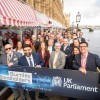Lancashire business leaders are calling on chancellor Rachel Reeves to create a climate for growth when she delivers her Budget next week.
The Chancellor is widely expected to unveil a package of tax hikes when she stands up in the Commons as she looks to tackle a shortfall in the government finances estimated to be around £20bn.
She pointed to that direction of travel in her pre-Budget speech. It saw her pledge a Budget for growth with “fairness at its heart”, that would make “the choices necessary to deliver strong foundations for the economy”.
While Ms Reeves struggles to find solutions to the nation’s economic challenges, businesses are reminding her they are still feeling the impact of her last Budget, which saw rises to employers’ National Insurance contributions.
That hike was coupled with an increase in the minimum wage, leaving some companies facing difficult choices around recruitment, investment and pricing.
Now business leaders, including Babs Murphy, chief executive of North and Western Lancashire Chamber of Commerce, are urging the chancellor not to pile more taxes on companies.
Instead, the chamber wants Ms Reeves to outline “a clear roadmap of growth and prosperity for UK businesses in an environment where they can thrive.”
Babs said: “Lancashire businesses have repeatedly demonstrated resilience and adaptability.
“They require the right conditions and targeted measures to unlock growth, investment, and job creation that contribute to the local economy and positively impact the wider UK economy.”
Katy Smythe, regional stakeholder and business manager for the Blackpool based Federation of Small Businesses (FSB), echoed the no tax rise call.
She said: “The chancellor must not pile further tax hikes on to small businesses and the self-employed at the Budget – it’s a recipe for the country getting poorer by the day and will stifle growth.
“We need to create a climate where small firms can grow and people feel confident to start a business.”
The FSB wants the threshold for Small Business Rate Relief in England raised to £25,000 from its current level of £12,000.
Katy added: “The Employment Allowance, which helps small employers offset the cost of National Insurance, should also be increased, to give relief from the rise in employers’ National Insurance contributions which was introduced in April.
“The economy cannot afford for small firms, who employ three-fifths of the private workforce, to stop hiring or cut staff numbers, and a higher Employment Allowance would be a huge help in this regard.”
The FSB adds that raising the VAT turnover threshold to £100,000, from its current level of £90,000, would be another welcome measure to encourage growth.
Matthew Johnson, partner at Preston-based WNJ accountants and business advisors says the situation ‘does not look particularly promising’ as the chancellor prepares her speech.
He said: “There is widespread agreement that taxes will rise – although there has been a major rowing back on suggestions that we were facing the first rise in the basic rate of income tax for 50 years.
“Instead, it seems likely that the freeze on income tax thresholds will be kept in place. The freeze was introduced in April 2023 and was due to expire in 2028.
“There are also reports the chancellor is considering introducing a charge for limited liability partnerships (LLPs), which could affect firms such as solicitors and accountants.
“Currently LLP profits aren’t subject to employers’ National Insurance but there is talk the government might add an equivalent charge.
“The government may look to change the scope of VAT. The most obvious tweak would be changing the threshold – lowering it would bring more businesses into the system.
“And there is speculation that there may also be a cut to the higher rates of pension tax relief, a hike in dividend tax and changes to the cash ISA allowance.
“Other measures being discussed by pundits in the run up to the big day, include a pay-per-mile charge for electric vehicles and higher taxes on gambling companies.
“Then there is the thorny matter of business rates. The government has acknowledged that the current system acts as a barrier to investment.”
He urged the chancellor to help small businesses, adding: “The chancellor may be in a really tight spot but a healthy and growing private sector, with small businesses that are looking to grow, is vital if productivity is to move in the right direction.
“SMEs employ nearly 60 per cent of the UK workforce. They are also the backbone of the county’s economy and it is vital that they are supported.
“The chancellor needs to understand that it is business that will drive growth, innovation and ultimately increase in the standards of living of the public.
“Without a prosperous private sector, the economy will shrink and have further downward pressure on total tax receipts.”
Chris Sanger, UK tax policy leader at Ernst and Young LLP, says the chancellor is contemplating how to raise the significant revenue required to reduce the likely fiscal shortfall, while also promoting greater investment in the UK.
He said: “The chancellor may be weighing up whether to make minor tweaks that affect a relatively small group of people, or pursue broader changes that impact everybody.”
However, he believes Corporation Tax is not on her radar, adding: “The UK’s current Corporation Tax rate of 25 per cent is around the middle of the pack among G20 countries and further increases there seem unlikely given the chancellor’s growth agenda.”
He said: “Beyond tax rate adjustments, the chancellor has several other revenue-generating options and, while these measures are unlikely to produce sufficient revenue on their own, they could provide funds that may be re-deployed to stimulate growth.
“One option is to explore revenue-raising measures to close the tax gap, the difference between the amount HMRC should collect and what it currently receives.
“For example, it is often asked whether the UK’s high VAT registration threshold incentivises those earning just below the limit to restrict their income or potentially underreport their income. To address this, we could see a reduction in the VAT threshold.”
Enjoyed this? Read more from Rob Kelly




















